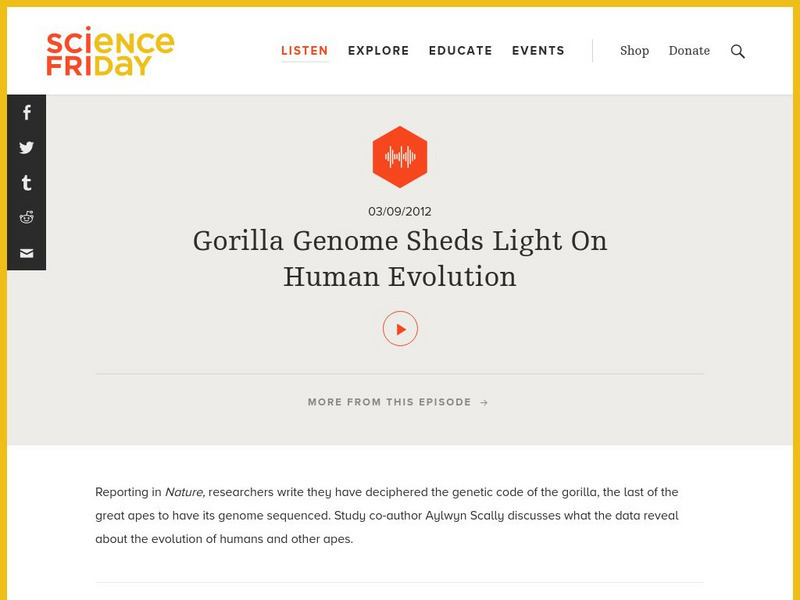Hi, what do you want to do?
Curated Video
Evidence for Human Evolution: Fossils and Stone Tools
This video introduces the theory of evolution by natural selection and explores evidence for human evolution, specifically through fossils and stone tools. The speaker explains that evolution is the gradual change in characteristics over...
Next Animation Studio
Poor posture due to smartphone use leads to ‘horn bone’ growth in skull: Study
New research from Australia has found that excess usage of smartphones causes a horn-like bone, known as enthesophytes, to grow at the back of the skull.
AllTime 10s
10 Mysteries Solved By Google Earth
No matter how much we find out about the earth, it always has more questions to answer. But thanks to Google mapping the entire planet, we're a lot closer to answering them than ever before. Here's 10 Mysteries Solved By Google Earth.
Financial Times
Masters of Science: the new human story
The Natural History Museum's Chris Stringer on recent discoveries that are challenging the way we think about our ancestors.
Cerebellum
Prehistoric Man Human Evolution - First Hominids
Beginning in the late nineteenth century and throughout the twentieth century, geologists, archaeologists and paleoanthropologists have given the world evidence of the physical and cultural development of humans. In this video the...
Curated Video
Lucy’s legacy: ancient hominin arrives in Prague the first in Europe
Prague’s newest visitor is 3.2 million years old. Lucy, the famed Australopithecus afarensis fossil, has arrived in the Czech capital alongside Selam, a young child of the same species, for a groundbreaking exhibition on human evolution.
Curated Video
Meet your hominid ancestors in Georgia
Archaelogical findings including fossilised bones and artefacts covering almost two million years of human evolution are on show at the Georgian National Museum as part of its exhibition ‘Stone Age Georgia’. Besides the fossils, visitors...
Curated Video
Swedish geneticist wins 2022 Nobel in Physiology or Medicine
This year's Nobel Prize in Physiology or Medicine has been awarded to Swedish geneticist Svante Pääbo for his research comparing the genome of modern humans and our closest extinct relatives.
Curated Video
More digging at site where new human species found
Archaeologists who discovered fossil bones and teeth of a previously unknown human species that thrived more than 50,000 years ago in the northern Philippines said on Thursday they plan more diggings and called for better protection of...
Curated OER
Evolution Primer #5: Did Humans Evolve?
Clear up any confusion regarding human evolution and ancestry with this comprehensive clip. Using scientific evidence and concrete examples such as DNA, this clip explains human evolution in a way elementary learners can understand. This...
Curated OER
Journey of Man: A Genetic Odyssey, Part 5 of 13
Part five of the 13-part series begins with a refutable argument stating that genetically, the ancient people of Australia were populated by the first African ancestors. Spencer Wells travels to India to find the link that bridges...
Curated OER
Human Evolution Made Easy
Add this video to your classroom collection! Human evolution is covered from the beginnings of evolutionary theory to the paleo-anthropologists who uncovered a multitude of evidence showing the changes that lead to modern man. Intended...
Curated OER
Human Ancestry Made Easy
Explore the Out of Africa Theory, genetics, and human ancestry with this clear and interesting video clip. Older scientists will gain a basic understanding of how genetic markers have helped anthropologists determine the origin and...
PBS
Pbs Learning Media: Evolving Ideas: Did Humans Evolve?
This video from Evolution explores the evolution of humans from a common ancestor of humans, chimpanzees, and other apes. [5:28]
PBS
Pbs Learning Media: Walking Tall
This video segment from Evolution: "Great Transformations" illustrates the differences between the skeletons of a chimpanzee (a knuckle-walker) and a human (a biped). [57 sec]
PBS
Pbs Nova: Becoming Human, Part 1
"Where did we come from? What makes us human?" Becoming Human is a three-part comprehensive examination of the latest research on our hominid relatives. Part 1 takes a critical look at what set us on the path from ape to human. The...
PBS
Pbs Nova: Becoming Human Part 1: First Steps
NOVA examines what set Homo sapiens apart from our ancestral cousins like the Neanderthals, the Hobbits, and others. We lived and thrived, why? Also, are we still evolving even today?
PBS
Pbs Nova: Becoming Human Part 3: Last Human Standing
Becoming Human Part 3: Last Human Standing, examines the fate of the last of the Neanderthals during the Ice Age. The question of "How did modern humans take over the world?", is explored. [01:20:00]
PBS
Pbs Nova: What Darwin Never Knew
Darwin figured out a lot, there is no doubt about that! But, what didn't he know? How does evolution work? What are the missing links? What makes us human? Here is a fascinating video on just that. Includes the full video as well as...
Khan Academy
Khan Academy: Human Evolution: Humanity on Earth
This session travels the earth tracking the evolution of humanity from the age of the dinosaurs through human beings. [12:26]
Smithsonian Institution
National Museum of Natural History: Qrius: Human Evolution Early Human Diets
An archaeologist explains how the bones of early humans can reveal information about their diets. [29:15]
Crash Course
Crash Course Big History #6: Human Evolution
John and Hank teach you about how human primates moved out of Africa, and how humans evolved. [16:14]
Science Friday Initiative
Science Friday: Gorilla Genome Sheds Light on Human Evolution
A look at recently published research on the decoding of the gorilla's genome and how this impacts on our understanding of human evolution. Aired Mar. 9, 2012 [12:24 min]
Crash Course
Crash Course Big History #204: Why Human Evolution Matters
This video focuses on why human evolution matters including the impact of collective learning, natural selection, cultural evolution, adaptation, the ability of communication, and the use of brain power and its ability to build on prior...


















